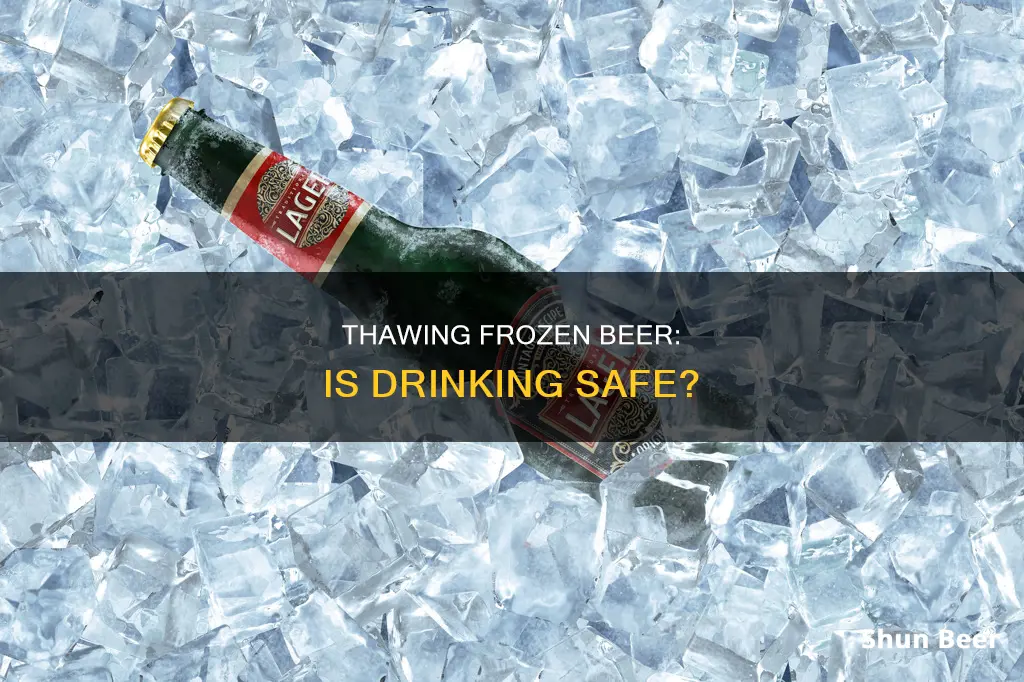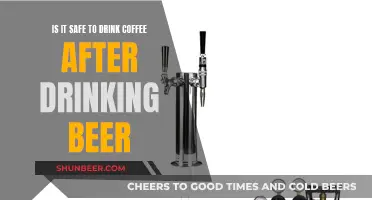
Freezing beer is a common problem, and it's important to know how to handle it to avoid wasting beer and creating a mess. Beer is mostly water, and when water freezes, it expands, which can cause beer bottles or cans to explode or leak. This expansion can also rupture the seal on the bottle or can, causing carbonation to escape, resulting in flat beer. To avoid this, it's crucial to thaw frozen beer slowly in a cool place, avoiding rapid temperature changes that could cause the glass to break. Drinking frozen beer without thawing is not recommended, as the first liquid to melt is alcohol, resulting in a higher alcohol concentration. Additionally, frozen beer can develop a chill haze, making it unappetizing. To chill beer quickly without freezing, submerge bottles in a bucket of salted ice water, which has a lower freezing point than regular water.
What You'll Learn

Will the glass bottle break?
When beer freezes, it can cause the glass bottle to break. This is because liquid expands when it freezes, creating more volume and pressure inside the bottle. If the bottle cannot contain this increased volume, it may break. However, it is also possible for the bottle to remain intact, depending on various factors.
The thickness of the glass and the elasticity of the bottle play a role in determining whether it will break. Bottles with thicker glass may be more resistant to breakage. Additionally, bottles with some elasticity may be able to accommodate the expansion of the liquid without breaking.
The amount of alcohol in the beer and the filling level of the bottle also influence the likelihood of breakage. Beer with a higher alcohol content may not freeze solid or expand as much, reducing the risk of breakage. Similarly, if the bottle is not filled to the brim, there may be enough space to accommodate the expansion of the liquid without breaking the bottle.
The freezing conditions, such as the temperature and duration of freezing, can also affect whether the bottle breaks. A poorly functioning freezer, high ambient temperatures, or short freezing times may decrease the chances of the bottle breaking.
To minimise the risk of breakage, it is recommended to thaw frozen beer bottles slowly using cold water rather than attempting rapid thawing, which can cause a significant temperature gradient and increase the likelihood of breakage.
The Magic of Beer Dispensers: How Do They Work?
You may want to see also

How to defrost frozen beer?
If you have accidentally frozen a beer, don't worry—it can be defrosted and it will still be drinkable. The key thing to check is whether the seal is intact. If the seal is broken, the beer will be flat. If the seal is intact, you can defrost the beer and it will taste normal.
To defrost a frozen beer, place it in a cool area, such as a refrigerator. Do not place it in a warm area, as this may cause the bottle or can to explode. It can take between 12 and 24 hours to defrost a beer, depending on the temperature. Do not run glass bottles under hot or warm water, as this may cause the glass to expand too quickly and break.
If you are planning on drinking previously frozen beer, make sure to let it thaw completely before drinking. This is because if you drink it when it is still partially frozen, the liquid you will drink first will be straight alcohol, as water stays frozen for longer than alcohol. Drinking a beer that hasn't fully defrosted will also result in you drinking it while it is in the "chill haze". This refers to an opaque sheen on the beer, as well as floating bits and chunks, which are unappetising.
BYOB: Beer Gardens and Personal Alcohol Consumption
You may want to see also

Is frozen beer ruined?
Freezing beer is not recommended, as it can ruin the beverage's texture, taste, and appearance. Beer takes several hours to freeze, and the longer it remains frozen, the more its quality decreases. However, if you accidentally freeze your beer, it may still be salvageable. Here's what you need to know about whether frozen beer is ruined or not:
Checking for Damage
Before attempting to defrost and consume frozen beer, it is crucial to inspect the bottles or cans for any signs of damage. Beer bottles or cans can explode in the freezer due to the expansion of liquid during freezing. Therefore, check if the bottles have shattered or if the cans or bottle caps have ruptured. If the container is damaged, discard the beer immediately, as it is no longer safe for consumption.
Seal Integrity
If your frozen beer's container appears intact, the next critical factor is the seal. Check whether the seal on cans or bottle caps has remained intact. Liquid expansion during freezing can increase volume and pressure, potentially compromising the seal. If the seal is broken, the beer will likely lose carbonation, resulting in a flat taste.
Defrosting
If your frozen beer's container is intact, and the seal is unbroken, you can proceed to defrost it. Place the beer in a cool area, such as the refrigerator, to allow it to thaw gradually. Avoid using warm or hot water, as rapid temperature changes can cause the glass to break. It is also important to let the beer completely return to its liquid state before drinking. Drinking partially thawed beer can result in consuming straight alcohol, as alcohol has a lower freezing point than water. Additionally, incomplete thawing can lead to "chill haze," which refers to an opaque sheen or floating bits and chunks in the beer, making it unappetizing.
In summary, while freezing beer is generally not advisable due to the potential negative impact on its quality, accidentally frozen beer may still be consumable if the container remains intact and the seal is unbroken. However, it is essential to exercise caution during the defrosting process to ensure the beer's safety and the best possible taste.
Beer and Pizza: A Match Made in Heaven?
You may want to see also

Does freezing beer increase its alcohol content?
Beer that has been frozen and then allowed to thaw is safe to drink, but it may not taste the same. If the seal on the bottle or can has remained intact, the beer will likely taste normal once it has completely returned to liquid form. However, if the seal has been broken, the beer will be flat as the carbonation will have escaped.
Freezing beer does not remove the alcohol content. In fact, it can be a way to increase the alcohol content of your drink. This process is known as "jacking" or fractional freezing. Since alcohol freezes at a lower temperature than water, you can separate the two by freezing beer and then drinking the liquid that melts first, which will be straight alcohol.
It is important to note that beer should be completely thawed before drinking to avoid consuming straight alcohol, which can be dangerous. Additionally, drinking beer that hasn't fully thawed can result in chill haze, which refers to an opaque sheen in the beer with floating bits and chunks. While this doesn't affect the taste or smell, it can be unappetizing.
To safely defrost frozen beer, it is recommended to place the bottles or cans in a Ziploc bag or container to avoid a mess in case of leakage. Then, move the beer to a cool place, such as the fridge, and let it sit for 12-24 hours until it has completely defrosted. Avoid using warm water to speed up the process, as this can cause the glass to expand too quickly and break.
Understanding Three-Burner Brewing: An Efficient Beer System
You may want to see also

What is the chill haze?
When a beer is chilled below a certain temperature, proteins from the malt form loose bonds with polyphenols from hops, creating a colloidal haze known as a "chill haze". This phenomenon is more likely to occur when the beer is chilled below 1.6°C (35°F). The haze is only temporary and will completely disappear as the beer returns to a warmer temperature.
Chill haze does not affect the flavour of the beer, but it can impact its shelf life. Polyphenols can cause the beer to go stale faster than usual, and hazy beers tend to go stale more quickly than clear beers.
There are several ways to prevent chill haze, including reducing the wort's exposure to oxygen, chilling the wort rapidly after boiling, using adjunct sugars instead of barley, and adding clarifiers and finings to help polyphenols drop out of the beer.
While chill haze itself does not affect taste, it can be an indicator of other issues that may impact the flavour of the beer. For example, if a beer has been exposed to freezing temperatures, the carbonation may be affected, resulting in a flatter taste. Additionally, if the beer has been stored for a long time, it may develop off-flavours along with the haze.
Drinking Beer After Donating Blood: What's Safe?
You may want to see also
Frequently asked questions
Drinking frozen beer is not recommended. If you do choose to drink it, make sure it has completely thawed to avoid drinking straight alcohol and to prevent "chill haze", which is when proteins bind together and cause an unappetising opaque sheen in your beer.
Beer is mostly water, and water expands when it freezes. This can cause beer bottles to break or the cap seals to fail, resulting in beer leaking everywhere.
Place the beer in a Ziploc bag or container to avoid a mess if it leaks. Then, put it in a cool place, like the fridge, and let it sit until it is defrosted. Do not put it in warm areas or run glass beer bottles under hot or warm water as the glass might expand too quickly and break.







